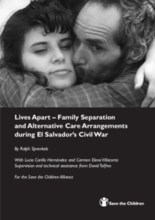This study was commissioned by the Save the Children Alliance initiative “Care and Protection of Separated Children in Emergencies” (CPSC) to investigate the phenomenon of El Salvador’s disappeared children. The fieldwork for the study was undertaken by the author heading a small research team consisting of two research assistants, one of them a former “disappeared” child. Considerable emphasis was placed on the active participation of children (now mostly young adults), their families of origin and foster or adoptive families. A small group of young people (who had also experienced forced disappearance) assisted in analyzing the material stemming from interviews, surveys and focus group discussion.
The study is based on the experience of PRO-BUSQUEDA, a Salvadoran organization founded in 1994, two years after the end of El Salvador’s twelve year civil war. PRO-BUSQUEDA has brought together hundreds of families searching for their children who disappeared during the civil war, in most cases abducted by government forces. Since its foundation, PRO-BUSQUEDA’s investigative unit has documented 653 cases of disappeared children and hassolved 204 of them.
PRO-BUSQUEDA’s experience is unique in many ways. It combines aspects of family tracing with a search process more similar to that of Argentina’s Grandmothers of the “Plaza de Mayo”. Because the disappearances occurred in a framework of massive human rights abuses which often constituted several human rights violations in themselves, PRO-BUSQUEDA’s work has many legal and political implications. Additionally, the investigative unit has gathered substantial evidence on the issues such as child trafficking and improper conduct by private institutions such as the Salvadoran Red Cross. As the Salvadoran government has set out to cover the past with a blanket of forgetfulness and impunity, PRO-BUSQUEDA’s work is not looked upon very favourably in official circles.
The study provides some detailed background information and illustrates thewide range of circumstances in which children disappeared. The main objective is to describe the range of care arrangements which the disappeared children experienced. Four categories are identified and discussed: children brought up in residential institutions, international adoption within the Salvadoran legal system, de facto adoption (which can also be described as fostering or appropriation) and growing up on a military base.
©International Save the Children Alliance

